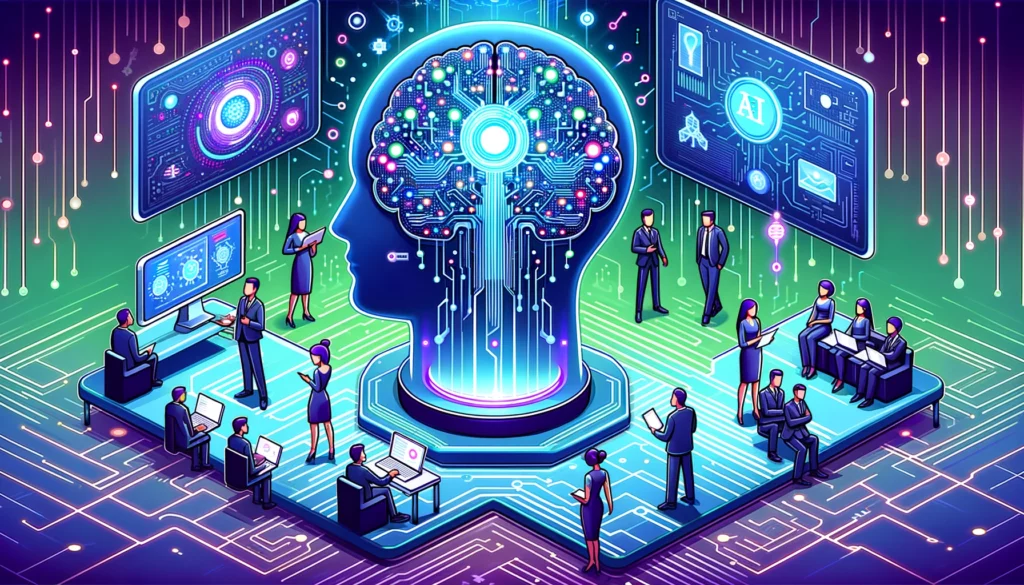Decentralized Autonomous Organizations (DAOs) are the epitome of community-driven collaboration and governance, harnessing the power of blockchain and distributed ledger technology to create consensus-based decision-making structures. However, for these innovative models to succeed in the long term, they need to evolve beyond human-driven mechanics and embrace the vast potential of artificial intelligence (AI).
In this deep dive, we will explore the groundbreaking intersection of AI and DAOs, elucidating how AI technologies can augment, enhance, and revolutionize the very fabric of decentralized governance.
The Intersection of AI and Decentralized Autonomous Organizations
The advent of AI in DAOs is not merely a tech-savvy upgrade; it’s a strategic pivot that can redefine the efficiency, transparency, and resilience of these governance structures. While the core philosophy of DAOs emphasizes the elimination of intermediary roles and tiers, AI dovetails beautifully into this ethos by providing the means to automate, optimize, and even predict the intricacies of community management and decision-making processes.
Enhancing Direct Democracy
Direct democracy, where all members vote on decisions, is pivotal to many DAOs. Traditional direct democracies are often bogged down by the sheer volume of decisions and the complexities of informed voting. AI can change the game by analyzing on-chain data and voter sentiment, providing concise and actionable insights that empower community members to vote knowledgeably rather than ideologically. Furthermore, predictive models can forecast the potential impact of proposals, ensuring that community resources are devoted to pursuits with the highest likelihood of success.
Delegative Democracy Reinvented
In the realm of delegative democracy, AI takes on the role of a talent scout and advisor. By sifting through massive datasets of community activities, AI can identify and recommend delegates who not only possess the necessary expertise but also resonate with the ethos and values of the DAO. Once chosen, AI can continue to support delegates by offering data-driven suggestions for optimal voting patterns, balancing the execution of their mandates with the broader community’s will.
Liquidity Management in Liquid Democracy
Liquid democracy, a hybrid model allowing a spectrum of community engagement, benefits from AI’s omnipresence in managing the dynamic and transitional nature of votes. With the ability to automate decision triggers and thresholds, AI can help the DAO navigate the fluidity between direct and representative voting, ensuring that the system remains responsive and adaptable in the face of evolving community dynamics.
Optimizing Tokenomics with AI
Tokenomics, the study of the economic properties of a cryptocurrency’s token, is the lifeblood of many DAOs. AI’s statistical prowess can transform tokenomics from a theoretical construct into a data-driven model for optimization. From analyzing token usage to recommending adjustments in reward structures, AI can fine-tune the economic incentives that drive community behavior, fostering a sustainable ecosystem with aligned long-term aspirations.
Fortifying Security and Managing Risks
The intelligent application of AI extends to the fundamental pillars of security and risk management. DAOs, embedded in the volatile and vulnerable landscape of the internet, are in dire need of robust defense mechanisms. AI-driven automated security audits, coupled with sophisticated risk assessment algorithms, can alleviate the burden of manual oversight, perpetually scanning for potential threats and vulnerabilities.
Revolutionizing Community Engagement
Community management is a delicate yet crucial aspect of a DAO’s operation, dictating the tenor of interactions and the depth of participation. AI, with its capacity for language processing and sentiment analysis, has the potential to transform how communities are nurtured and sustained. By facilitating multilingual support and offering personalized communications at scale, AI can cultivate an inclusive and engaged community that feels heard and valued.
Case Studies and Emerging Technologies
Real-world case studies and prototype technologies are beginning to illustrate the transformative role of AI in DAO operations. For instance, AI-driven chatbots are providing round-the-clock support to community members, tackling routine inquiries with efficiency and consistency. Prototypes for sentiment analysis tools that gauge community mood are showing promise in preempting potential contentious issues and fostering proactive avenues for resolution.
Case Study: AI in the Mirror of the DAO
A groundbreaking project saw an AI system dynamically adjust tokenomics to counteract the concentrated dumping of tokens by a disgruntled member, thereby stabilizing and restoring faith in the currency. This intervention not only averted a potential crisis but also earned the system acclamation for its responsiveness to outlier behaviors.
The Next Frontier: AI DAO Experiments
Pioneering crypto-enthusiasts and tech innovators are currently experimenting with AI-integrated DAO models, marking the inception of what could become the norm in decentralized governance. These initial forays into a symbiotic relationship between AI and DAOs are revealing unprecedented possibilities, from the sophisticated management of community funds to the personalized recognition of stakeholders’ contributions.
The Ethical and Regulatory Landscape
The fusion of AI and decentralized governance does not occur in a vacuum but within a broader context of ethical considerations and regulatory frameworks. Ensuring that the application of AI remains ethically sound, transparent, and aligned with the original goals of the DAO is a non-trivial challenge. Moreover, the evolving landscape of AI governance demands a constant reevaluation of practices to safeguard against the misuse and misrepresentation of AI’s capabilities.
Navigating the Ethical Quagmire
As AI permeates the decision-making processes of DAOs, it is crucial to establish ethical guardrails that prevent the erosion of community trust. Transparency in AI operations, the ethical handling of data, and a commitment to fairness are foundational principles that should guide the integration of AI in decentralized governance.
The Role of Regulation in AI-enabled DAOs
With the potential for AI to alter the very fabric of financial and social systems, regulatory bodies are starting to take notice. The emergence of a new category of ‘AI-enabled DAOs’ could necessitate regulatory updates that reflect the unique intricacies and potential risks associated with these systems. Collaborations between technologists, ethicists, and regulators are essential in crafting a regulatory environment that fosters innovation while mitigating the risks inherent in AI-powered governance.






